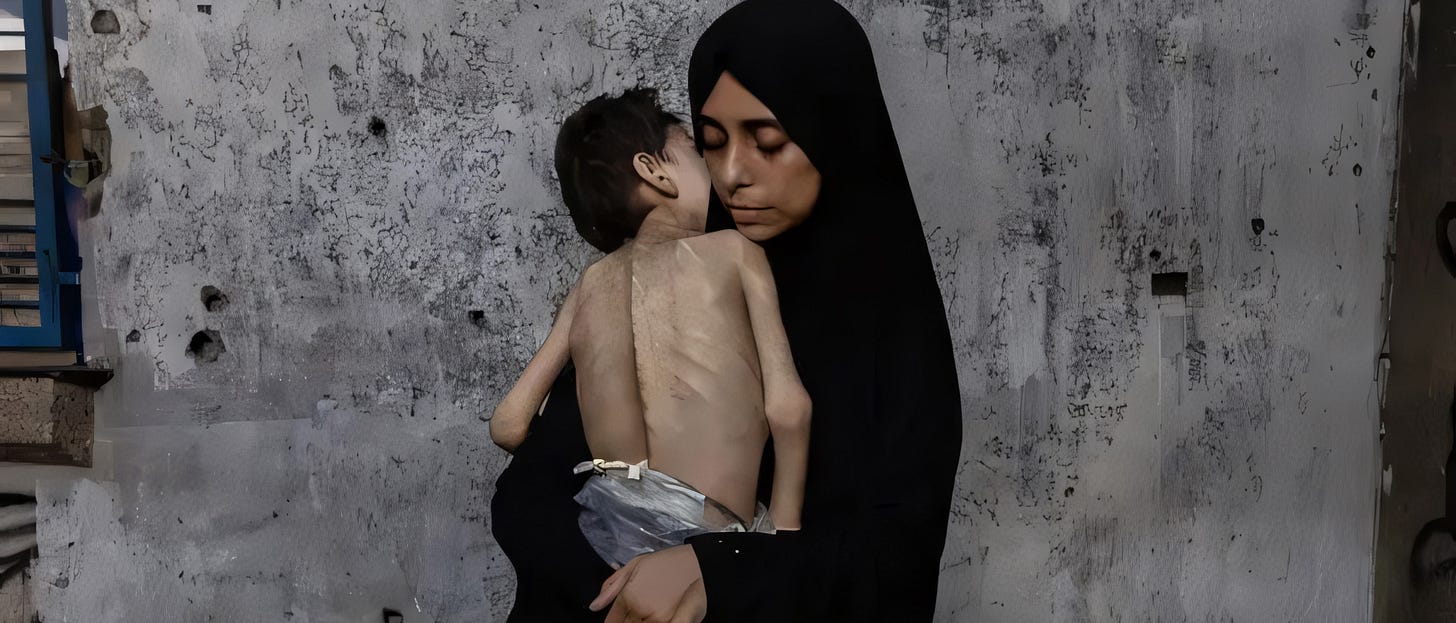What up, friends. Apologies for the hiatus. This was caused by a short vacation in Europe, and the following week heading over to Providence for a remarkable conference on the cultural and historical roots of American horror, organized by my Brainy Friend Adam™, under the auspicious of the Liberty Fund. Another attendee — esteemed fiction and non-fiction writer (and proprietor of the Iliad Bookstore in Los Angeles) Lisa Morten — wrote a truly excellent piece about the event and her thoughts about famed Providence local and genre-defining literary stylist H. P. Lovecraft. Bookmark for later.
The combination of all this — getting locked to GMT, then flying back to California, spending two days on Pacific Time before a 3am cab and a day flying to spend three days attempting to sound smart on Eastern Time, then a day’s travel back to Pacific Time, narrowly avoiding storms that grounded a lot of planes — predictably meant my brain wasn’t anywhere near my skull for most of last week. Not least because some asshole left the bedside alarm in Providence set to 6am for my first morning there.
A Cold Revolution
Also, if I’m honest, I’ve found myself at a loss to know how to react to or describe <gestures wildly at everything happening, everywhere>. I’ve found myself doing what I discovered described in the work of my new favorite Gloomy French Philosopher, who I’ve fallen into as a result of one of the readings in the Rhode Island conference:
“Each individual, however, can produce in himself a sort of cold revolution, by moving for a while outside the flow of information and advertising. This is quite simple: it has never been so easy to adopt an aesthetic position towards the world: you just need to step aside.”
— Michel Houellebecq
This is true — and I have felt the need for a period of stepping out of the constant flow — but also how they control us, of course. My wife and I (as naturalized US citizens) were a tiny bit intrigued to see how things would go at immigration when we returned after being in Europe. No, I was not hauled into a back room on the basis of previous tweets suggesting less-than-total approval of the President. I am very white. But we both noticed a distinct lack of warmth in the demeanor of the guy at the kiosk, whereas previously we’d been dependably greeted with a cheery “Welcome back!” I’m sure we were being over-sensitive. But over-sensitivity is sometimes the problem.
This, and a largely-forgotten epic tale, got me thinking.
The benefits, and dangers, of context
Yesterday I came across a fascinating piece on CNN about The Song of Wade. This is not, as might appear from the name, a lament about someone with a mullet being refused service in a Hooters — but a semi-mysterious Medieval saga. Though wildly popular well into the Renaissance period the story itself is now all but lost, inferred only from glancing references in other texts. These fragments have long led scholars to assume it was a stirring fantasy epic somewhat in the mode of Beowulf.
Except, it wasn’t. As detailed in the article, researchers recently re-examined a quote from the poem that had been preserved in a 13th century sermon — a presumably rather jaunty pop culture reference for the time, like a priest of today dropping in a mention of Stranger Things, or a Billie Eilish lyric — and the context makes it seem probable that the Medieval guy transcribing the sermon made a mistake.
The text concerns the dangers inherent in going out into the world and dealing with all the bad guys out there. With that in mind, it can be compellingly argued that the word “ylues” within the sermon’s quotation from Wade (and this is where the whole idea of the saga being fantastical came from in the first place) was an error, and the first letter should have been a “w”, changing the word to mean “wolves” — obviously metaphorical for low men of that type.
The researchers conclude that The Song of Wade was far more likely to have been a tale of chivalric romance and social commentary than some yesteryore Lord of the Rings, which explains Chaucer (who was far more concerned with courtly doings than sea serpents) twice mentioning it in his work. This kind of thing is weirdly interesting to a word nerd, but also makes an instructive point about how we cannot ever truly understand anything in the world unless we take care to observe its context. Epistemology can never be absolute. It is always relative.
However. Context can also be dangerous.
Screw context
There is a famine in Gaza. It’s happening right now. It’s already appalling and it’s going to get far worse. Merely typing those words, however, throws me straight into a cage fight of context. “But Hamas are monsters” some will immediately shout, and I agree. “But you’re being an anti-semite” others will claim, and I disagree.
I’m honored to call Art Spiegelman a friend — the author of Maus and thus a guy who you’d really be stretching to call an anti-semite — and he’s made his position clear, including in a graphic story for The Guardian co-authored with fellow cartoon activist Joe Sacco. Please click the link and read the whole thing.
The problem is any discussion of this subject gets derailed into this endless context. Into competition between the contrasting historical ways in which Jewish people and the occupants of Gaza have been horrifically mistreated. Into precisely what Hamas has done, the innocent Jewish people it has slain, and the unforgivably mangled lives it has left behind as a result. Into the fact that when Netanyahu lifted the siege on Gaza aid back in May all he really did was (deliberately) slow-roll the descent into famine — with the added bonus of hundreds of Palestinians now having been murdered by gunfire at collection points. Into whether the present furore over anti-semitism in the US is merely an excuse for Trump to hammer “woke” universities into submission. Into whether he and Netanyahu are in cahoots because they both want to cling onto power or make real estate deals. Into… {continue in this vein until the end of time, getting louder and louder, until the point of the entire discussion is forgotten}.
Every single piece of this is important. Context is the frame of truth. It is however also a wall around the most pressing truth. We can go back and forth forever on iterative context, and so we do: everyone desperate to throw in facts to show how smart and engaged they are, while anxious also to avoid being canceled for saying not quite the right thing for any given audience. That achieves nothing. Instead we need to do what Houellebecq suggests — and have the courage to step for a moment outside the flow of information and advertising, the stream of context, and instead stare reality in the face.
Because people are dying. Children are starving to death. So are adults. People who have nothing to do with Hamas and simply wanted to live their goddamned lives without being bombed or dispossessed or turned into barely-moving skeletons, their hollow faces crawled over by fat and greedy flies.
People should be allowed to point this out and protest it, without being arrested as they are in the UK — where people in their sixties and seventies are being hauled off to jail just for holding signs. They should be allowed to point it out and protest it, without being immediately accused of anti-semitism, as they are in the US and around the world. People should be allowed to shout THIS IS NOT OKAY, and keep shouting it.
Children are dying — and it is especially revolting that this is happening just as the world is patting itself on the back for Live Aid, forty years ago. The images are horribly similar. Men, women and children are dying in front of our eyes but it’s not the environment’s fault this time. It’s not a drought. It’s sleek and vicious men in expensive suits — on both sides — doing it deliberately, for their own ends, to increase their own power and wealth. Context is unimportant in the face of that monstrous reality, and this is far, far more horrific than anything H. P. Lovecraft ever dreamed up. There is absolutely no context that makes this okay.
Few of us have much power. I get that. But the very least we can do is have the courage to keep shouting about it. We cannot pretend to be a civilized world while this is happening, or while any attempt to foreground it in people’s attention is extinguished under a fire-blanket of endless “context”. In this case, for once, fuck all the context.
The only important fact is that children are dying.







Thanks, Michael. I think this is a rather gorgeous piece, proclaiming the dignity of ALL people. So very much appreciated. I'm amazed at how tribal we've all (meaning society) has become, and I think we all need to appreciate universal dignity rather than tribal allegiance. As Cicero said (and, no, I'm not just trying to sound smart--taking this from your post above), we need to be Citizens of the Cosmopolis, of the universe itself. On a different note, I'm definitely proud to be an American and proud to be your fellow American. Sorry about the frostiness of the security guy--I get that every time I go through security, but I assume it's my libertarian paranoia. Anyway, a brilliant post. Thank you.
So hard to read and so brilliant. Sleek and vicious men. Thank you